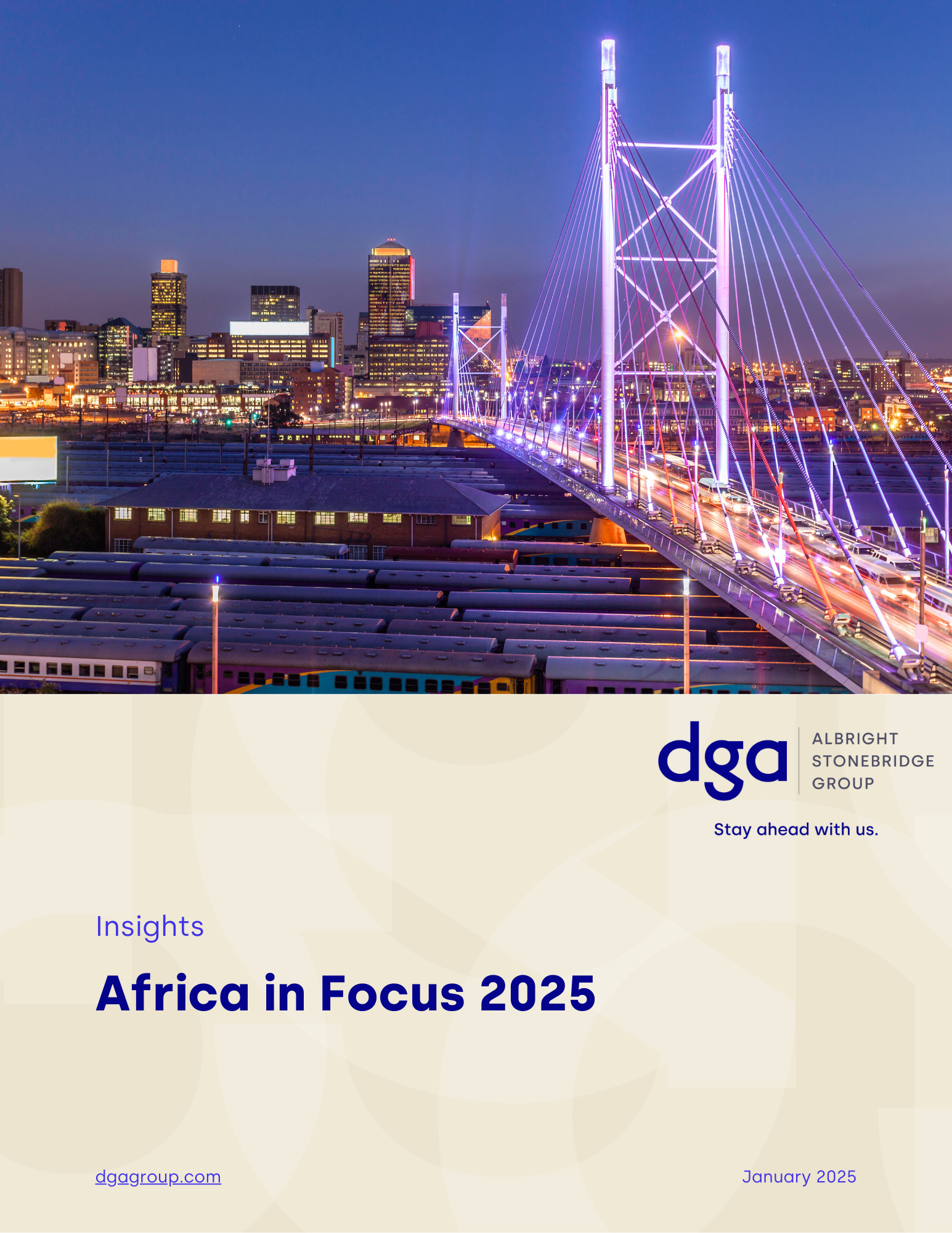Africa in Focus 2025

Strategic Outlook
Africa experienced a transformative year with numerous elections leading to shifts in governance and increased public demands for economic progress. As the continent faces 2025, it stands at a pivotal juncture, where private investment is essential to driving sustainable development and meeting rising expectations. This evolving landscape presents a wealth of opportunities for strategic investors ready to navigate complexities and capitalize on emerging trends.
The investors who will thrive in Africa are those with robust analysis, deep regional expertise, and strong partnerships to anticipate risks and capitalize on opportunities. In this rapidly evolving landscape, agility and adaptability will be the keys to maintaining a competitive edge.
Key Regional and Investment Trends
Political Pressure and Private Sector Role: Many democratically-elected African governments are under pressure from increasingly vocal citizens to deliver economic results. With challenging fiscal realities to contend with, governments view the private sector and private investors as critical partners for development.
Policy Reforms: Some African governments are pursuing structural and investor-friendly reforms, including special economic zones (SEZs) and regulatory streamlining, in their bid to deliver economic results.
Green Transition and Economic Diversification: Africa’s commitments to renewable energy and critical mineral production are driving global transitions to greener economies. Investments in energy infrastructure are creating opportunities across supply chains and adjacent markets.
Technology Boom: Africa’s digital transformation is accelerating, driven by fintech innovation, mobile payments, and emerging technologies like AI and blockchain. Significant investment is expected in digital payments, remittance services, virtual asset platforms, and cross-border payment solutions.
Growing Global Position: Africa is more integrated than ever in global markets, supply chains, and geopolitical frameworks. Increasing integration under the AfCFTA is drawing attention from investors seeking to capitalize on Africa’s potential.
U.S., China, and the Rise of Middle Powers: The U.S. is expected to emphasize transactional partnerships under a Trump administration, while China focuses on sustainable debt models and diversified partnerships. These shifts in great power approaches are creating openings for other global players, such as middle power investors, to strengthen their foothold.
Gulf Investment Amidst Diversification Efforts: Saudi Arabia and the UAE are expanding their footprint in Africa by investing in key infrastructure (ports, logistics hubs) and critical minerals. These initiatives align with some African government efforts to reduce reliance on China as a single dominant partner, while positioning the Gulf nations as essential suppliers for electric vehicles and renewable technologies.
Countries to Watch
- Côte d’Ivoire: A consistent economic performer, Côte d’Ivoire is solidifying its role as a regional trade and logistics hub. Investments in port modernization and renewable energy highlight its commitment to diversification. Growing U.S. ties and reduced reliance on France are notable trends.
- Ethiopia: Opportunities abound in agriculture, logistics, and manufacturing. Investor-friendly policies, such as opening the banking sector to foreign firms and reintroducing a stock exchange, make Ethiopia a key destination.
- Ghana: With a stable political environment and thriving fintech ecosystem, Ghana is poised for growth in renewable energy and services. The election of John Mahama has been positively received by investors.
- Kenya: As East Africa’s economic hub, Kenya leads in mobile finance and digital innovation. Infrastructure projects are bolstering logistics and trade, while the government balances socio-economic pressures with necessary reforms.
- Morocco: A leader in renewable energy, Morocco attracts investments in logistics, green energy, and automotive manufacturing. Its political stability and forward-looking policies reinforce its investment appeal.
- Nigeria: Despite economic challenges, Nigeria’s resilient tech ecosystem and entrepreneurial population drive fintech and e-commerce growth. Fiscal reforms under the Tinubu administration aim to re-establish Nigeria as an investment destination.
- Rwanda: Known for ease of doing business, Rwanda excels in corporate governance and innovation, particularly in tech and services. The re-election of President Kagame signals continued pro-business policies.
- Senegal: New oil and gas discoveries position Senegal as a key player in energy and infrastructure. Governance improvements and political stability following recent elections enhance its business climate.
- South Africa: While growth remains subdued, progress in mining, financial services, and green energy is evident. Lower inflation, improved power availability, and political resilience create a more stable investment environment.
- Tanzania: Growth in agriculture and tourism, supported by infrastructure upgrades, makes Tanzania attractive. However, recent political crackdowns could pose risks to progress.
Risks and Opportunities
Significant risks accompany Africa’s vast investment opportunities. Infrastructure gaps, regulatory hurdles, uneven policy implementation, political interference, and security concerns are some of the obstacles to capturing the continent’s remarkable potential investment returns.
While the challenges are daunting, for investors seeking long-term high impact returns, Africa’s growing strategic importance and diverse opportunities make it a key destination for capital in a shifting global landscape.
About DGA Group
DGA Group is a global advisory firm that helps clients protect – and grow – what they have built in today’s complex business environment. We understand the challenges and opportunities in an increasingly regulated and interconnected world. Leveraging the expertise and experience of our team at Albright Stonebridge Group, a leader in global strategy and commercial diplomacy, and a deep bench of communications, public affairs, government relations and business intelligence consultants, we help clients navigate and shape global policy, reputational and financial issues. To learn more, visit dgagroup.com.
For additional information or to arrange a follow-up, please contact Paul.Ansah@dgagroup.com.